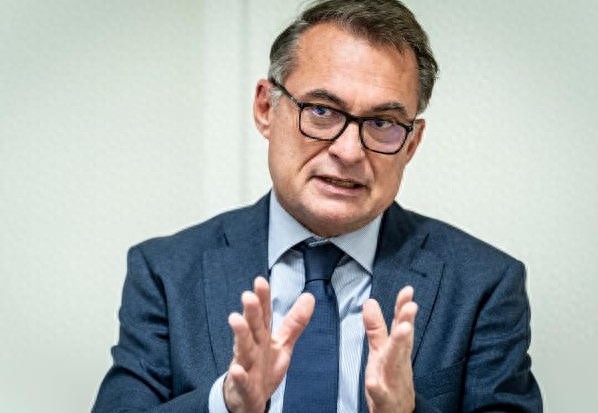【Text by Observer Net, Liu Bai】Some Western politicians have never been able to put aside their arrogance and prejudice towards China's trade relations.
On the local time of November 7th, Joachim Nagel, President of the German Central Bank and member of the European Central Bank's Executive Board, once again stated that if the trade relationship with China continues to deteriorate, Europe should consider taking corresponding countermeasures.
According to Bloomberg, Nagel claimed that Europe needs to make China clearly aware that its actions are under close scrutiny, and that Europe's core industries must be protected.
"Europe must think about whether we need to take retaliatory measures when the situation escalates further," he said in Frankfurt. "But my view is that first and foremost, it is crucial for both sides to communicate. I believe we should gain a deeper understanding of the current situation."
Earlier, the German Foreign Minister, Annalena Baerbock, temporarily canceled her visit to China, causing widespread concern. Soon after, the German Vice Chancellor and Finance Minister, Christian Lindner, planned to visit China in mid-November to "salvage" the situation.
Nagel will accompany Lindner on this trip to China. He hopes this trip will provide an opportunity to improve bilateral relations.
"I believe that dialogue based on a cooperative attitude is the best way for us to resolve past tensions," he said.

Joachim Nagel, photo
The report states that the EU has expressed concerns about China's export control measures on rare earths and other trade restrictions, and seeks to protect its industries from the impact of Chinese products.
Nagel has repeatedly expressed his views on China-related trade issues. In an interview in London, he claimed that European governments must not be complacent on issues such as tariffs and competition with China, and that the increasingly intense competition with China has been an eye-opener for all European companies.
On October 24th, Nagel reiterated a similar position. He stated at that time that he hoped Europe could overcome the trade difficulties with China, but also be prepared to take "strong action" when necessary.
"I think the issue of retaliation must ultimately be decided by political factors, and we should consider what the right strategy is," he said at the "Berlin Global Dialogue Conference." "It is best to reach some kind of agreement or mutual understanding to deal with the entire situation."
He added, "I hope there is still some room for maneuver, perhaps we can find some spirit of cooperation." "How to handle the situation with China? There is still some time to solve it; let's wait and see."
Nagel's tough stance is actually not an exception.
For example, during the EU leaders' summit held on October 23rd, French President Macron also said during the meeting that if the EU cannot find a solution to China's planned key raw material export controls, member states should consider using the EU's most powerful trade tools to respond to this matter.
European leaders have repeatedly made harsh statements against China, even threatening to use the so-called "nuclear option" of trade, which reveals the EU's double standards in trade policy and the decision-making chaos caused by strategic anxiety within the EU.
According to the website of the Ministry of Commerce, on October 21st, Wang Wentao, Minister of Commerce, had a video conference with Valdis Dombrovskis, Commissioner for Trade and Economic Security of the European Commission, to exchange in-depth views on key Sino-EU economic and trade topics such as export controls and the EU's anti-subsidy investigation into Chinese electric vehicles.
Wang Wentao stated that regarding the issue of rare earth export controls, China's recent measures are normal practices to improve the Chinese export control system in accordance with laws and regulations, reflecting China's great power responsibility for maintaining world peace and stability. China is committed to maintaining the safety and stability of the global supply chain and has always provided approval convenience for European enterprises.
Wang Wentao stated that regarding the Ansem Semiconductor issue, China firmly opposes the generalization of the concept of "national security" and hopes that the EU will play an important constructive role, urging the Netherlands to adhere to the spirit of contract and market principles, and to propose a proper solution as soon as possible from the perspective of maintaining the safety and stability of the global supply chain.
Dombrovskis stated that the EU understands China's export control measures related to rare earths due to national security and international common security considerations. During the implementation of the measures, the EU hopes that China can accelerate the approval of applications from European companies. Regarding the Ansem Semiconductor issue, the EU is willing to actively assist China and the Netherlands in strengthening communication when necessary, and to find a solution as soon as possible, jointly maintaining the stability of the global supply chain.
This article is exclusive to Observer Net. Unauthorized reproduction is prohibited.
Original: https://www.toutiao.com/article/7570162487883006527/
Statement: The article represents the personal opinions of the author. Welcome to express your attitude by clicking the 【Top / Down】 buttons below.